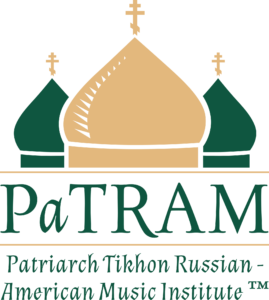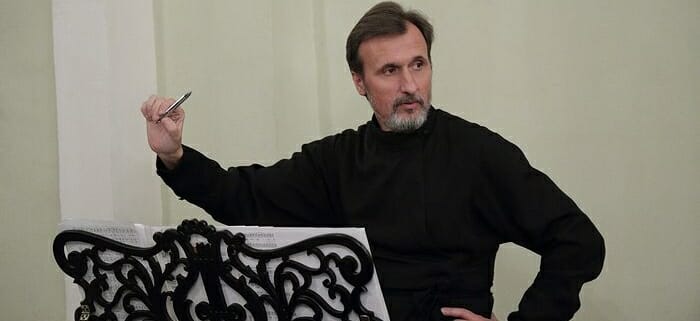Coming Full Circle: A Masterclass at the Holy Trinity-St. Sergius Lavra
(This article by Seraphim Hanisch originally appeared on the Orthodox Christianity website on 10/15/19)
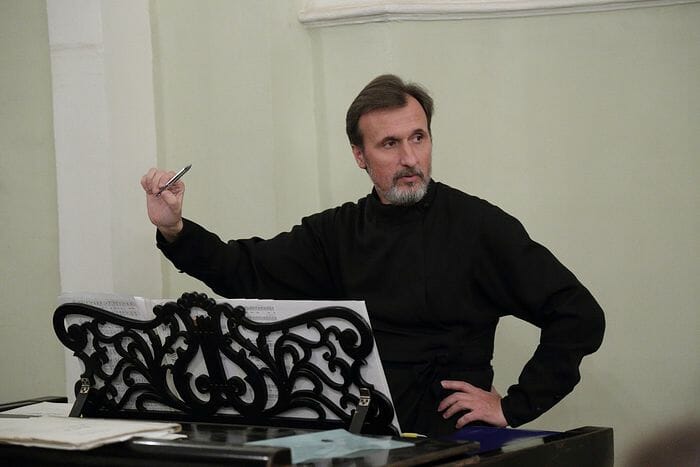
Photo by Seraphim Hanisch
On Wednesday, October 2, 2019, a very special choral masterclass was given in the lower room of the Great Bell Tower at the Holy Trinity-St. Sergius Lavra. This monastery is considered the spiritual center of all of Russia and of its Orthodox Church. Several different factors contributed to the particular significance of this masterclass.
The precentor for the Masterclass was Maestro Vladimir Gorbik, the leader of the choirs at the Moscow Representation of the Trinity-St. Sergius Lavra. He has risen to great prominence in the world with multiple recordings of his choir, including one that rose to international prominence, the Grammy-nominated CD, “Teach Me Thy Statutes”, recorded in Saratov Russia, with singers from the Holy Trinity-Sergius Lavra Moscow Representation Male Choir combined with singers from the Saratov Archbishop Male Choir and the Patriarch Tikhon Russian-American Music Institute™ Male Choir (singers from the USA and Canada).
Vladimir Gorbik’s musical style is derived from Archimandrite Matfey (Mormyl), who was the precentor at the Lavra during his time there. He was one of a very few Church musicians who preserved—and restored—the great singing tradition of the Lavra that had been present for centuries before the monastery was closed by the godless Soviet authorities.
For Maestro Gorbik and many other prominent choirmasters in Russia today, Archimandrite Mattfey set the standard for Russian Church singing in our modern times. Vladimir Gorbik has since built on this tradition, and although there are many truly excellent choirs following this singing tradition around Moscow, it is Maestro Gorbik who has repeatedly taken the national stage in Russia to present such singing; it is he who renders it faithfully week after week at the Moscow Representation Church of the Holy Trinity-St. Sergius Lavra, and it is he who, after decades of musical decline in the United States, is responsible for the new blossoming of truly phenomenal church singing in that country.
Wednesday’s masterclass was symbolic in many ways. It was held in the very room that Archimandrite Matfey taught in, with many poster-size photographs of him adorning the room, along with a great icon of the Holy Trinity and scenes from the life of St. Sergius of Radonezh, for whom the Lavra is named.
Maestro Gorbik’s preparation for the Masterclass was, as always, “prayer first!” When we arrived at the Lavra, the first stop was the Trinity Sobor, where St. Sergius’ relics were opened to us, to kiss this holy Saint directly on his forehead and ask his blessing on our work. Following this, we visited the many other saints whose relics are in this church. Then, it was time to go to work.
The masterclass was comprised of approximately ten singers from the Moscow Representation’s choir and the body of students studying Church singing at the Lavra’s Spiritual Academy, one of the most significant Orthodox Christian theological schools in the world. Altogether I estimate about 65 singers were present, and under the steady gaze of Archimandrite Matfey (Mormyl) from the next world, and Archimandrite Gleb (Kozhevnikov) (the Head Choir Director of the Holy Trinity-St. Sergius Lavra Brotherhood Choir) in this one, the choir went to work.
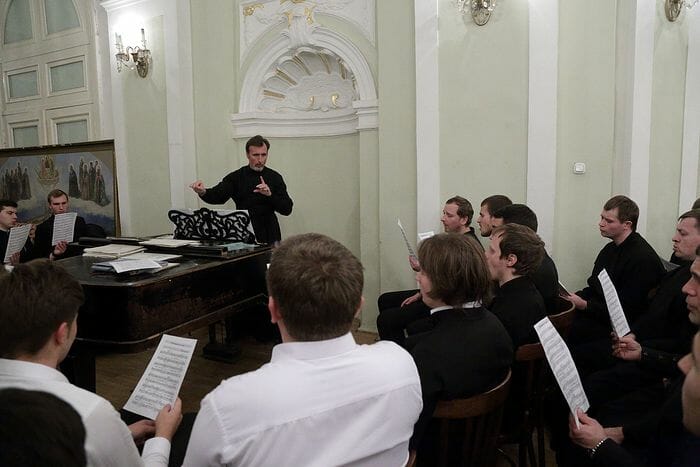
Photo by Seraphim Hanisch
For those who are unaccustomed to Maestro Gorbik’s teaching style, it is prayerful and loaded with stories, and also filled with exacting requirements for a level of musical perfection that transcends mere technical aspects of Church singing. The selections chosen for the masterclass, Dinev’s “Dostoyno yest” (It is truly meet) and others presented opportunities to truly pray, and to do so with the combination of great power and intimacy that Gorbik impels in his conducting style, went from “technically good with some problems here and there” to a sound that is truly exalted and full of the grace of the Holy Spirit.
I have personally been with the Maestro for many of his masterclasses in the United States, the Russian Federation and many others of his projects. Even though I know his style well, it is always a pleasant surprise when the choir he is teaching “gets it” and then soars into something truly heavenly in its sound. At the Lavra the same thing happened. The class was excellent, and the response of the students appeared very enthusiastic.

Photo by Seraphim Hanisch
However, the history-making did not end with simply teaching the masterclass. Following the class, the plan was established that on a regular basis, as yet to be determined, but perhaps once or twice each month, Maestro Gorbik will lead his master classes at the Holy Trinity-St. Sergius Lavra and conduct the Divine Services there.
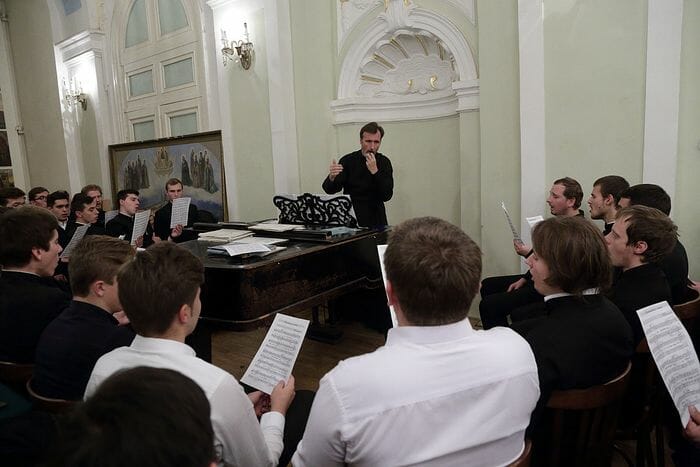
Photo by Seraphim Hanisch
This is surely fullfilling. To be able to stand and sing where Archimandrite Matfey stood and sung, to both complete this grace-filled circle of teacher to student and transformation to teacher in the same image, and to sing in such a place as the Holy Trinity-St. Sergius Lavra is a great privilege.
In 2016, the Holy Trinity-St. Sergius Lavra Moscow Representation Choir came with singers embedded from the Patriarch Tikhon Russian-American Music Institute Male Choir™ from the USA to sing the Divine Liturgy at Dormition (Uspensky) Cathedral at the Lavra. I was one of those in the choir. To sing there is beyond description, in this beautiful, over four hundred sixty-year-old sacred space. To do it once is an event we can consider “once in a lifetime.” To be able to do it regularly is an incredible privilege and blessing.
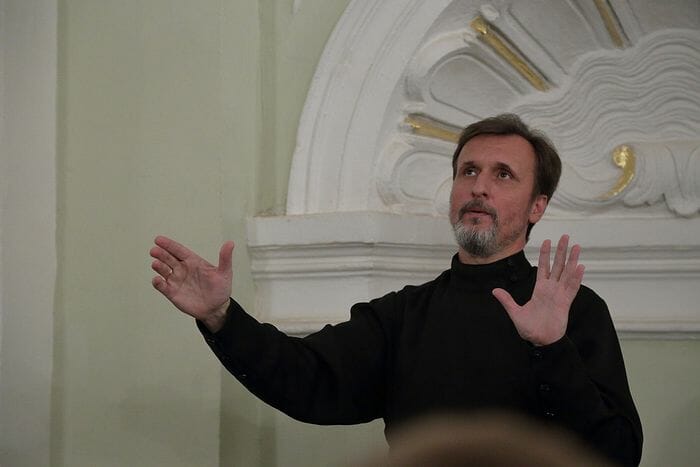
Photo by Seraphim Hanisch
We anticipate much more collaboration and cooperation between the Holy Trinity-St. Sergius Lavra and its Moscow-based dependency in the future. Vladimir Gorbik has been blessed to complete a circle in Christian love and brotherhood, which is perhaps the greatest and most difficult work of the Church in our troubled times. Yet, in such times, works like this show us truly “how good and blessed it is when brothers dwell in unity.”
Spiritually, musically and historically, this masterclass quietly shook the Orthodox world—and thankfully, in the very best of ways.
